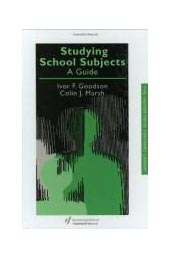Studying School Subjects: a guide
Conclusions, Complexities and Conjectures
The deep structures of curriculum differentiation are historically linked to different educational sectors, to different social class clienteles and occupational destinations, to different status hierarchies. Differentiated curricula and the social structure are matched on very firm foundations: by building on these foundations comprehensive reorganisation has had to accept the antecedent structures which contradict its stated ideal.
CONJECTURES AND CURRENT DEBATES
Beyond the specific conclusions and complexities noted there seems some evidence for suggesting that the embryonic theoretical framework of this study provides a useful starting point for other studies. Such studies, by extending the focus and the analysis, will test the generalisability of some of the broader conjectures contained herein.
In considering future studies it is perhaps worth re-examining the limitations of the current study. Firstly the research focused on the promotion of only three school subjects and the detailed negotiation of just one examination syllabus. Clearly then studies are needed to elucidate further the detailed connection between promotional strategies and 'rhetorics' and the 'reality' of the curriculum content and classroom practice. There are a number of levels within the educational system each with varying degrees of autonomy. Hence whilst we have seen that the academic tradition is most commonly used to promote school subjects far more detailed study is required of how far this promotional activity effects the 'small print' of curriculum content, both within the range of examination syllabuses, in the associated but by no means directly related examination question papers and within school classrooms. Above all, in following up the studies in this book, such detailed investigation of the relationships between these complex arenas and levels of curriculum negotiation must be undertaken. With rural studies we know that promotional rhetoric substantially affected the curriculum 'reality' of a new 'A' level syllabus in environmental studies. We also know that this process of translation from rhetoric to notional reality was deeply contested by groups inside and outside the subject community.
